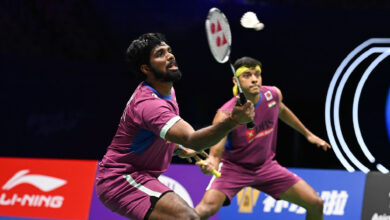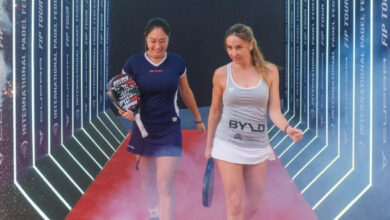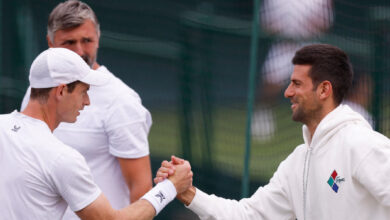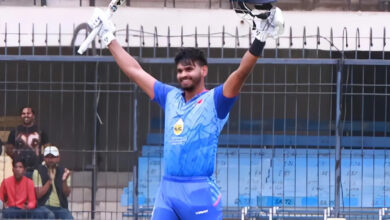From having no motivation to being excited to wrestle, Vinesh Phogat makes progress on the mat

It begins as a self-deprecating joke. But as Vinesh Phogat starts to peel off the layers, she reveals the extremes she had to go to propel her from a dark, deep corner and back into the spotlight on the wrestling mat.
One Saturday, a few months ago, she went out on the 400m track to test her endurance running as many laps as she could in three minutes, the time duration for one round of a wrestling bout. “I could not even complete one lap! I got so exhausted, I felt like vomiting.” During sparring sessions, wrestlers much smaller and lighter than Vinesh began pummeling her. “Unhone mujhe utha, utha ke maara (They threw me around),” she laughs.
Then, in February, she travelled to anbul to take part in the Yasar Dogu International. The former world number one wanted to gauge if she’d have to start from 0 all over again but her findings were far more severe.
The competitive fire within her seemed to have doused. “I was dull. I did not feel anything… haarna hai, jeetna hai, khelne aayi hoon? (win, lose, have I come to compete?) I was confused, in some other world,” she reflects. “If someone took two points against me, then I thought of giving up easily instead of fighting back.”
Vinesh won Monday’s selection trials for the Commonwealth Games, a result she says gives her ‘reassurance and relief’ that ‘everything is on track’. But for months after last year’s Tokyo Olympics, the thought of ‘giving up’ had been a recurring one, which must be frustrating for a wrestler whose game is a lot about chutzpah and doggedness.
In Rio, it was the physical pain caused twing her knee during a bout. In Tokyo, it was the ‘mental torture’ that undid her. (File)
For most athletes, the Olympics are the ultimate highlights of their careers. For Vinesh, however, they’ve caused nothing but heartbreaks and miseries.
In Rio, it was the physical pain caused twing her knee during a bout. In Tokyo, it was the ‘mental torture’ that undid her. Her campaign ended in the first round, was subsequently sanctioned the federation for perceived ‘indiscipline’ and, in an emotional piece for The Indian Express, Vinesh narrated how she was left broken after unfair criticism of her performance.
“I had no motivation. I was so tired mentally I thought, chod do sab, nahi karni wrestling. My body wasn’t picking up and mind had given up. Imagine how it must feel if it reaches a stage where an athlete wants to stop doing the only thing she has done all her life?” she says. “But something within me still convinced me to give one more shot. Call it inner voice or whatever… that drive has always been there. So I thought, let’s see where this takes me. Dekhenge kya likh rakha hai kismat ne. (Let us see what fate has to offer)”
It took two months, Vinesh says, to come out of that phase. And several more to return to something that resembled her peak.A year ago, Vinesh wasn’t the self-doubting, low-on-confidence wrestler that she’d become. She was flying high, beating almost every opponent that stood in her way, winning titles, climbing up the rankings chart and becoming one of the favourites to win a medal in the 53kg category at the Tokyo Games.
On the day of the competition, she lost in the quarterfinals to former world champion Vanesa Kaladzinskaya of Belarus, which sparked criticisms mainly from within the wrestling federation. Vinesh would have given up, she admits, but the thought that the rivals she had consently beaten before had finished on the podium gave her some confidence to return to the mat. “So I know what my level is. There are some shortcomings, I know. Gir, gir k seekh gaye thoda,” she smiles.
Self-monitoring progress
The diary she frequently updated until last year has no entry after the Olympics. Now, however, she maintains data that is much more helpful in her comeback trail. Vinesh records every tiny detail to monitor her progress: the rate of her heartbeats while running, sprint timings, the average times of the 400m laps she runs, and her speed while attacking.“When I note this data and see the improvement on a weekly basis, it gives me a lot of confidence,” she says. “And really, it’s all about confidence for me. If I am feeling good, I’ll perform well. And I gather confidence from training.”
The diary she frequently updated until last year has no entry after the Olympics. Now, however, she maintains data that is much more helpful in her comeback trail. (File)
She gives a peek into the other side of elite sport, something that the HD cameras and flashlights do not always capture: the long periods of training alone, away from the spotlight, at venues that are far from glamorous.
Vinesh cut her diet to keep her average weight within a couple of kilos of 53kg, the weight class she competes in. She lifted weights, ran sprints and spent hours on the mat at the training centre in Lucknow.
“It took a while but gradually, I stopped leaking points and started scoring some. First, against the girls from the 50kg category and then, after around six weeks, I started doing well against wrestlers from my category. That gave me some confidence. While doing strength exercises, say for example in weight lifting I showed some improvements. My attacking speed improved and I started running two 400m laps within three minutes,” she says, adding that the concussion she suffered is on the mend, too. “It made me feel more confident about myself.”
Back to 70 percent
Convinced that she’d reached a level where she could compete again, Vinesh decided to take part in the selection trials for the Commonwealth Games; her first ‘full trials’ since the Olympics. The fight to get into the team for the CWG is far tougher than winning the gold medal at the Games, given the low level of competition among the Commonwealth nations.“If we start putting the same level of effort for the Olympics as we do for the CWG trials the, bhaisaab, we’ll reach a different level,” Vinesh laughs.
She felt it in her category especially, where her opponents smelt blood. Despite the progress she’d made in the last few months with respect to her fitness, Vinesh was still vulnerable because of a lack of match practice. “Everyone saw a chance to attack me. I have never seen 11 girls giving a trial in my category so perhaps, everyone was in the mood to attack. Abhi pakdo, abhi pakdo (Let us attack),” she says.
It didn’t bother her. Vinesh is no longer consumed the thought of winning. That’s important, too, she inss, but she is in pursuit of self-satisfaction and happiness. Wins and medals, she says, will be a -product.
At the trials, she says she reached 70 percent of previous levels. “I was a bit hesitant to attack, wasn’t sure if it’ll be a success. I still have to work more to sustain for six minutes with the same intensity during a bout. I haven’t reached that level. But I am not putting pressure on myself. It’ll happen gradually,” she says.
She’s counting, instead, on other big gains. “I spent two months remaining injury-free. I am calm and excited to wrestle,” she says. “I am enjoying again, there’s no burden. And for me, that’s most important.”







